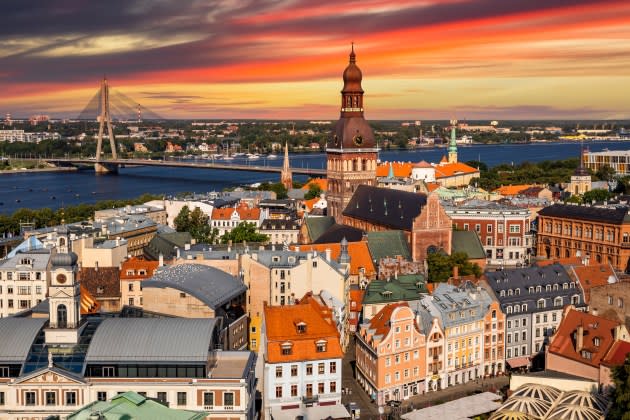EBU Joins Journalism Orgs In Sounding Alarm Over Latvia’s Plans To Remove Russian Language From Public Sector Media

The European Broadcasting Union (EBU) has joined international journalism organisations in sounding the alarm over Latvia’s plans to remove the Russian language from public sector broadcasting, even though it is the mother tongue of one third of its 1.8 million population.
“We are concerned that this new proposal will mean Russian speakers in Latvia will no longer have regular access to credible and fact-checked information, leaving them exposed to disinformation, fake news, and propaganda,” read a statement issued by the EBU and half a dozen journalism bodies.
More from Deadline
Israel Defies International Film Community By Signing Filmmaking Pact With Russia
BBC Russia Editor Shares Theory As To Why Putin Lets Him Remain In Moscow
Russian President Vladimir Putin Gives First Remarks Since Mercenary Group's Failed Rebellion
“The ability of public service media to provide vital information and connect with all of society is especially critical in light of Russia’s aggression in Ukraine.”
Latvia’s move to ban Russian-language content is included in the country’s revised national security measures which were approved by the Latvian parliament (Saeima) on September 28.
The updated framework, setting out the Baltic state’s strategy to deal with direct and indirect threats, features a number of measures devised in the wake of deteriorating relations with neighboring Russia following its invasion of Ukraine.
At the beginning of this year, Latvia joined its Baltic neighbor Estonia in downgrading its diplomatic relations with Russia, sending its Russian ambassadors back to Moscow.
The new national security measures include a stipulation that as of January 1, 2026, all content on Latvian public media should be only in Latvian or a language that “belongs to the European cultural space”. State financing for Russian-language content will also cease.
This means there will be no longer be Russian language content on state Latvian TV and radio networks, while dedicated Russian-language services will also be wound down.
The measure does not extend to the private sector so Russian-language content will still be available on commercial channels.
The EBU and the journalist organisations pointed to the fact that the Russian language is spoken natively by at least one third of Latvia’s population, including not only ethnic Russians, who make up around a quarter of the population, but many other minorities such as Ukrainian refugees.
“Currently, Latvian TV and Latvian Radio provide content in a range of minority languages through a variety of platforms including the RUS.LSM portal which reached over 200,000 visitors in August 2023 and connects with many more on social media, and Latvian Radio 4 which reaches around 150,000 listeners a week and has around 1.3 million listeners to their podcasts every year,” they said.
The signatory organisations – which also included the European Federation of Journalists, International Federation of Journalists, Justice for Journalists Foundation, South East Europe Media Organisation, Reporters Without Borders and Committee to Protect Journalist – called on the Latvian government to reconsider the proposal.
“If adopted, the proposal will undermine citizens’ fundamental human rights – as enshrined in international, EU and European human rights law – to ‘access the media and impart and receive information including in their own language’. These principles are also reflected in the Latvian Law on Public Electronic Mass Media and Administration,” they said.
In the backdrop, the proposal follows in the wake of Latvian legislation passed last year phasing out teaching in Russian, so that as of 2025 the only language used in the country’s schools will be Latvian, as well as street signage in Russian.
Best of Deadline
2023 Premiere Dates For New & Returning Series On Broadcast, Cable & Streaming
SAG-AFTRA Interim Agreements: Full List Of Movies And TV Series
Sign up for Deadline's Newsletter. For the latest news, follow us on Facebook, Twitter, and Instagram.
